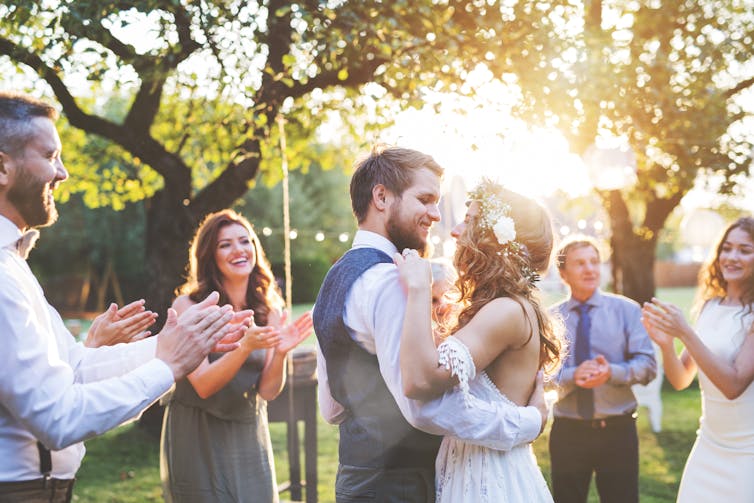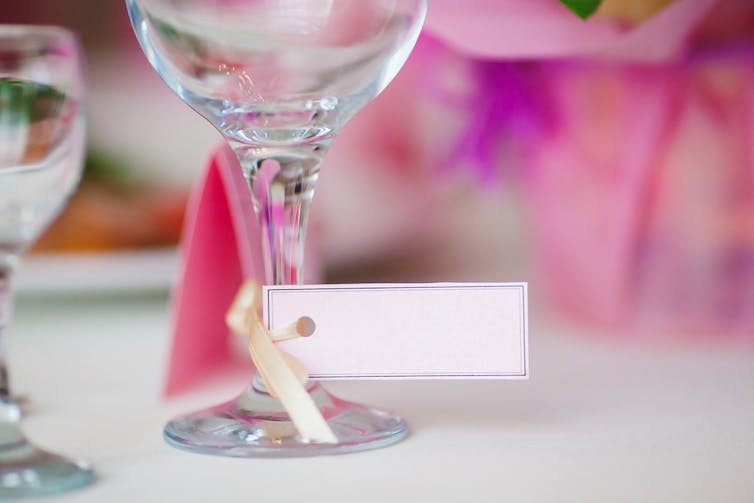10 tips for hosting a COVID-safe wedding
- Written by Philip Russo, Associate Professor, Director Cabrini Monash University Department of Nursing Research, Monash University
Spring and summer in Australia and the gradual easing of restrictions means we can expect weddings, with more guests, back on the calendar.
However, any wedding you plan or attend will be quite different to one held before COVID-19.
The rules around how many wedding guests are allowed change over time, and differ by state and territory. You can find the most up-to-date advice for your jurisdiction by following the links in this guide.
Besides following restrictions on how many people can attend, if you’re planning a wedding, there’s lots you can do to minimise the risk of coronavirus spread on the big day.
Why can pandemic weddings be risky?
We know COVID-19 is spread by close contact with an infected person, contact with droplets from coughs or sneezes (larger droplets or tiny aerosolised ones), or touching surfaces the droplets have contaminated.
We also know of particular COVID-19 outbreaks associated with weddings. Why? Because weddings tick all the boxes that make certain events especially risky for transmission. Weddings usually involve:
large numbers of people, close together
people congregating for a long time
poor ventilation, if inside
aerobic activity, if dancing
lots of singing or loud voices
alcohol (meaning potentially less COVID-safe behaviour)
sharing objects, food or drink.
So to reduce the risk during the pandemic, couples and guests need to consider these issues.
Read more: Coronavirus restrictions in your state
What to think about when planning
1. Smaller is better
The number of guests that can attend varies depending on where you live, the size of the venue, and whether the wedding is inside or outside.
But even if you’re allowed 100 guests or more, generally speaking, the fewer the better to reduce your risk of transmission.
2. Outside is better
The best venue will be outdoors — open air, natural ventilation and lots of space. That’s because the risk of transmission indoors is around 18 times higher than outdoors.
If you choose an inside venue, ask about ventilation, because poor ventilation and crowding can increase the risk of transmission.
Read more: 7 questions answered on how to socialise safely as coronavirus restrictions ease
3. Keep it short
Instead of the usual ceremony followed by a reception that goes late into the night, keep it short. For example, a ten-minute service followed by an hour or two of celebration.
We know the risk of COVID-19 spread is related to length of exposure, so the shorter the time spent in close contact — particularly in confined spaces — the lower the risk.
4. Plan for physical distancing
If there’s a sit-down meal, use only every second seat. So a table that normally sits ten will only accommodate five.
Place markings on the floor to indicate an appropriate distance to stand apart. And encourage guests to avoid congregating around entrances, exits, toilets and bars.
 Outside is better than inside, if possible.
Shutterstock
Outside is better than inside, if possible.
Shutterstock
5. Tell everyone the rules
With every invitation, include this brief list of rules, so everybody knows what to expect:
please social distance by 1.5m, including when dancing
regularly use hand sanitiser available throughout the venue
use the COVIDSafe app
stay home if you are unwell (including the bridal party).
That last one is particularly important. If guests feel unwell (even with mild, flu-like symptoms), they must not attend.
And if you are unwell, cancel. We know it’s hard to cancel an event you’ve been looking forward to, but this important message remains the same. If you have any symptoms, stay at home and get tested at the earliest opportunity.
6. Ditch the vigorous dancing
Skip the loud music and vigorous dancing. This only invites close contact combined with aerobic activity and loud vocalisation. You don’t want to turn this into a gym class because they too have been associated with outbreaks.
Read more: We're more likely to let our COVID-19 guard down around those we love most
7. Watch the alcohol
Consider limiting the amount of alcohol served. Rather than the traditional endless supply of beer and wine, consider one or two classy cocktails per guest.
The shorter duration of the celebration should also reduce the likelihood of poor decision-making that comes with drinking too much.
8. Tag everyone’s glass
Place an easily identifiable tag on each glass so there’s no confusion about which one belongs to whom. That way you minimise the chance of people drinking from someone else’s and transferring the virus via contaminated glasses.
And on the day, raise your glasses rather than clinking them.
 Is that my glass? With a tag, you’ll always know.
Shutterstock
Is that my glass? With a tag, you’ll always know.
Shutterstock
9. No buffet
Don’t share food or utensils. That means no buffets or serveries. Engage some wait staff to serve the food instead.
It’s a good idea to ensure your venue has a COVID-safe plan. This will guide the processes waiters and other staff serving your guests will follow.
10. Provide hand sanitiser
Put hand-sanitiser dispensers on every table, and at entrances and exits, at a minimum, and encourage your guests to use it.
How to be a COVID-safe wedding guest
If you’re lucky enough to be one of the select folks invited to the wedding, you have a responsibility to keep yourself and others safe.
Frequently use the hand sanitiser provided, or stay away altogether if you’re sick.
Follow the guidelines for your jurisdiction regarding mask use.
Read more: Nice to meet you, now back off! How to socially distance without seeming rude
Don’t rush up to others expecting warm hugs and kisses. Respectfully keep your distance, and encourage others to do the same.
And don’t kiss the bride — unless you’re the one who has just married her.
A wedding during this pandemic will be different, but still fun. Remember, at the end of the day, the happy couple will still end up being married, which is what it’s all about, right?
Authors: Philip Russo, Associate Professor, Director Cabrini Monash University Department of Nursing Research, Monash University


















